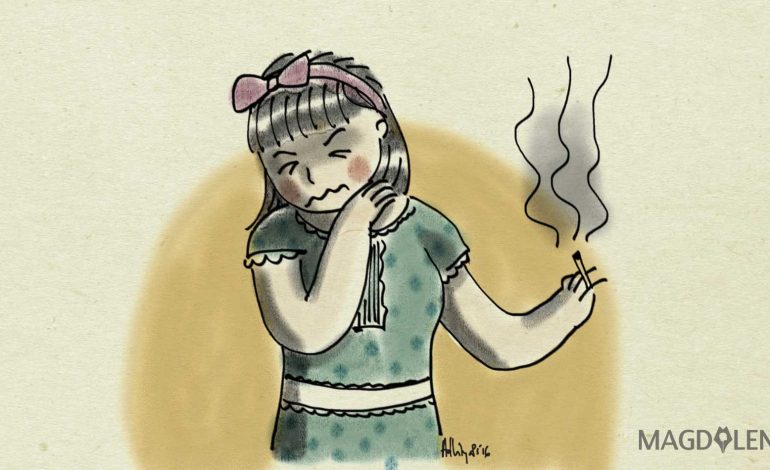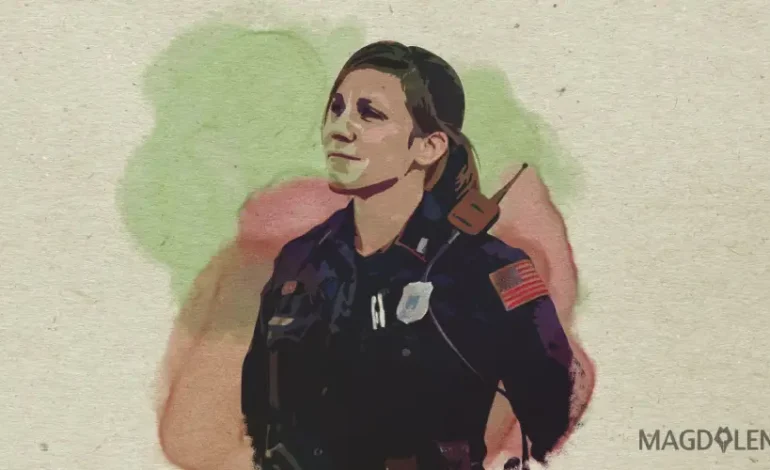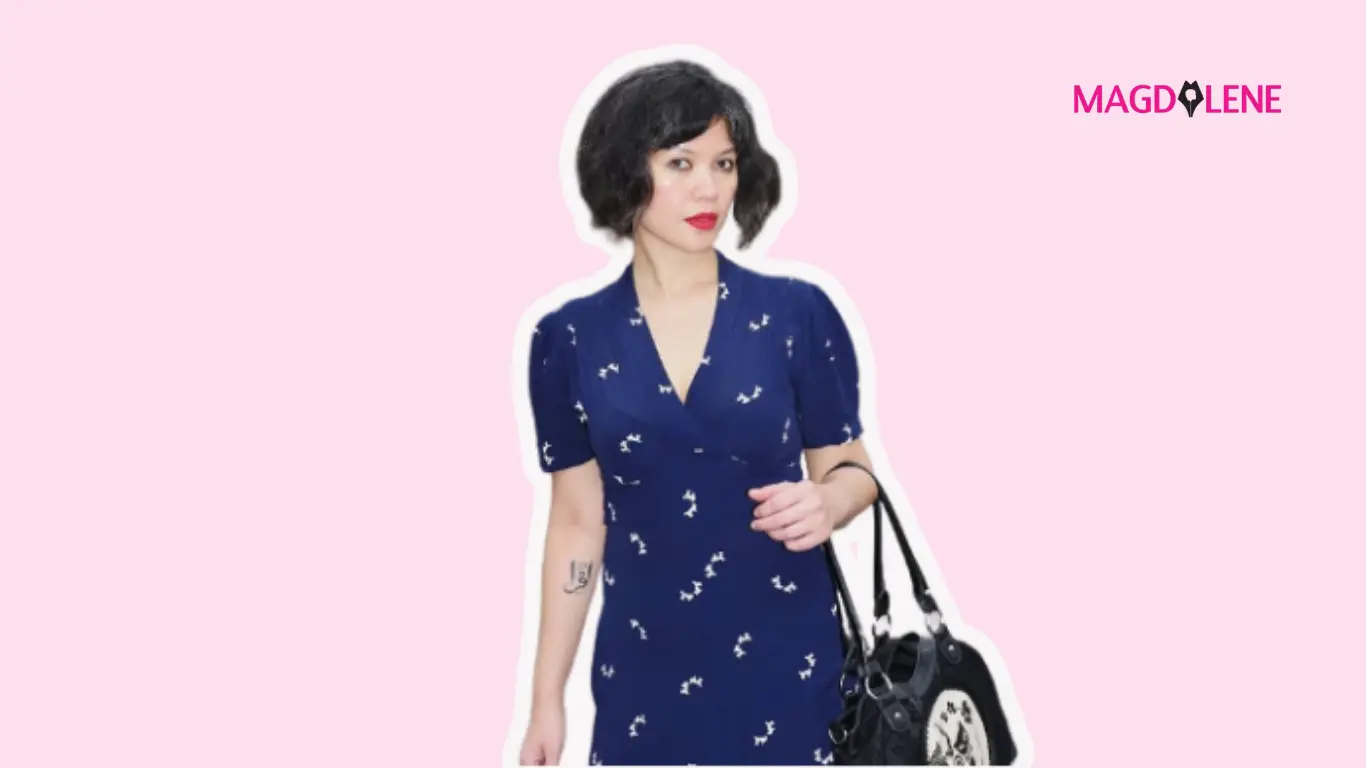Not A ‘Good Girl’, But I Enjoy Being the Woman That I Am

Ever since I was little I loved doing the opposite of what people told me girls should do. A teacher said good girls kept their gaze lowered; I kept my eyes straight ahead. Friends said girls were weak; I showed them the opposite by lifting four chairs at once during kerja bakti. Parents told me nice girls were neat and feminine; I kept my room messy and wore spiky pants like a punk. I wanted to show that girls could be other than those things they said.
This pride was somewhat chipped when I started having crushes on boys. Turned out, even though they hung out on the streets and smoked, boys wanted their girls to stay at home, not smoke, be neat and feminine. Everything I wasn’t.
“That’s not fair,” I complained to Mom.
“That’s the real world for you, dear,” said Mom, “even if they had had sex with many women, men will still only marry virgin girls.”
“If that’s the case, I will never marry,” said little 12-year old me, chafing at the unfairness of the world.
In high school I had imagined many hot and steamy make-out sessions with various classmates in the corner of classrooms or backstage at Pentas Seni. Kissing, necking, but that was it. My imaginations were sexy, but not yet sexual. Still, my high school was very conservative, and I had to keep them to myself.
But my personality leaked out of me the way I shed sweat and dead skin cells. I complimented boys on how good they looked (big no-no, it turned out). I cussed; I climbed the roof of my dorm to watch the sunset, and was called vulgar, cheap, weirdo, crazy, radical, slut. My roommates bullied me so much that I was terrified to go back to my dorm room.
Nearing graduation I got a scholarship to study in the US. I thought, finally, I was going to be “part of that world”, where “they don’t reprimand their daughters”. (The theme song of The Little Mermaid was also the theme song of my teenage years). I was sick of drowning. I was ready to fly.
Surprise, surprise! When a boy approached me romantically, I was scared out my wits. I thought of having sex with him – after all if good girls stayed virgin until marriage, then I really should be having sex. Then it occurred to me that if I was having sex just to be a “rebel”, wouldn’t it be the same as avoiding sex just to be a “good girl”? Being daddy’s little rebel felt as bad to me as being daddy’s little girl. I realized I wasn’t ready to have sex, so I didn’t.
After that, I questioned a lot of other things. Did I really hate wearing skirts, or did I only want to oppose the image of traditional femininity? Did I really like smoking? Now that I found myself in a place where there were many other more vocal women fighting for gender equality, I thought every little thing I do didn’t need to be proving a point anymore. I could finally explore who I really was.
Turned out I liked wearing skirts and dresses, I didn’t like smoking, and for a long time I wasn’t ready to have sex. I avoided boys altogether, rather than risking explaining to them that if we went out, I wouldn’t want to have sex. I still hadn’t the confidence to share my thoughts with the world, however. And I cultivated the persona of a party girl – I would stay over at a friend’s and walked home the next morning in last night’s outfit, so that people thought I was on a “walk-of-shame”.
One day, I knew I was ready to have sex. There was no doubt. To me the first-time was an initiation to have real adventures. I always knew I wanted to have many lovers. Back in Jakarta, some people thought that just because I was a party girl it meant I would always be available for sex. Some thought that when I had to go help my family, I was merely “playing the part of a good girl”. To that I wanted to say, “But I am a good person”, but still didn’t have the confidence. Yet, being thought of a “bad girl” was less troubling to me than if people found out I didn’t lose my virginity till I was out of college.
That was why when I was 26 and decided to marry, I had conflicting feelings. My husband supports me to be the best version of myself that I want to be, yet close to our wedding time I imagined people sneering all around me: “She finally succumbs to a conventional ending” or “I told you, all her rebellious bullshit was just a youthful phase.” Noooo…!!!
Until now I’m still more comfortable referring to my husband as my “boyfriend” or “partner,” but I’m also more confident in sharing my thoughts with the world.
Speaking of that, here’s a confession: it turns out I enjoy cooking, specifically vegetarian cooking. Also, I like repurposing used furniture and making home decorations from found objects. True, we can’t afford new furniture, but I like that it challenges me to be creative, not consumptive. I dream about having a house furnished with recycled objects.
Yet I dread posting pictures on social media about the things I cooked or made. I’m much more comfortable publishing a story about using drugs rather than about cooking or sewing. I guess cooking and craft to me are like free sex and alcohol to conservative girls. I imagine people ridiculing me for being too feminine, for conforming to a mainstream, oppressive idea of what a woman should be. I realized I’m still afraid of how others might judge me as a woman.
But I’m not rebelling just for the sake of rebelling. I sincerely believe that girls and women should be free and safe to be true to themselves, and to explore their interests, rather than having to follow some arbitrary rules.
So this year, in lieu of resolutions, I’ve decided to “come out”. Why should I be ashamed that I like to cook and upcycle things? Those hobbies are another outlet for my creativity. It doesn’t mean that because I cook or take care of my home then I would surrender my fate to my husband or father or anyone else.
I’m still me. I sang the Dead Boys’ “Ain’t It Fun” and Frozen’s “Let It Go” in a karaoke bar (the latter is such an empowering song to me). I wrote a novel about young people who protested against the government and had a lot of sex. I’ve followed Chef Heidi Swanson and devised my own dishes. I’ve made a bar out of old shelves, made a paper dress with the proofs of my novel, made body scrubs and lip balm with herbs and oils. I will not stop writing from the perspective of people who are often labeled “bad”.
There. Make of me what you want.
Eliza Vitri Handayani recently discovered that she enjoys very much taking care of her little nephews, so it seems she also has a maternal side, and that’s entirely okay. 🙂






















